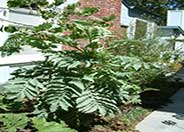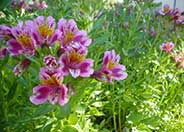
Common name:Honey Bush
Botanical name:Melianthus major
Melianthus major is an evergreen shrub. It is a soft-wooded plant of rapid growth to 12'-14'. It has a boldly patterned foliage with grayish green leaves of 1' long, divided into 9-11 strongly toothed leaflets. Foliage smells disagreeable when brushed or bruised. Foot-long spikes of reddish brown, 1" flowers appear in late winter, early spring.

Common name:Sweet Orange cultivars
Botanical name:Citrus sinensis
This tree will grow 20'-30' high and 10'-15' wide; it produces sweet, tasty oranges. It has shiny green, leathery foliage and produces clusters of fragrant white flowers that bloom in the spring.

Common name:Peruvian Lily, Alstroemeria
Botanical name:Alstroemeria hybrids
The deciduous rhizomes of this Peruvian Lily will often run aggressively if not controlled. They grow best in full to partial sun with some summer watering in dry climates. The florist strains can reach 6' tall, while the compact strains range from 12" 36" tall. For extra long, florist quality stems, stake or grow through netting for support. -Moterey Bay Nursery

Common name:Hybrid Tea Rose (selections)
Botanical name:Rosa Hybrid Tea varieties
These shrubs and vines are the most loved in the Western USA and are very resilient. They come in a wide variety of sizes and colors and are easy to maintain with proper care. They can be used in a water-conserving garden with careful attention to irrigation practices.

Common name:Sonoma Sage, Creeping Sage
Botanical name:Salvia sonomensis
This low growing, native groundcover has glaucous (covered with whitish, waxy material) green leaves with blue violet flowers that bloom in the spring and summer.

Common name:Mexican Blue Sage
Botanical name:Salvia chamaedryoides
Low mounding perennial with long bloom spreads by underground runners. Produces a small, silvery foliage which serves as a background for bright blue flowers. Bruised leaves have spicy fragrance. Native to eastern Mexico 7-9000' in desert habitat Grows to mature size of 2' tall and wide. Heaviest bloom in spring and early fall, intermittent throughout the rest of the season. Full sun, well drained site. No fertilizer. Drought tolerant.
Dealing With Drought
More than half of the water used at your home is for outside purposes. Studies show that on average, half of the water used outdoors is wasted. The leading cause of waste is incorrectly set and poorly managed irrigation controllers. The second biggest cause of wastage is broken irrigation equipment that goes undetected. There are a few basic things you can do to make a big difference in your water use.
Click in the green box for more information
| Designer: Jan Smithen | One of the Perennial Beds |
Photographer: GardenSoft |
Soils and Compost:
Physical weed control, including mulching, or hand removal protects the watershed from harmful chemicals.
Water Saving Tip:
Mulching and adding compost to soil can minimize evaporation and help soil absorb and store water.
Integrated Pest Management:
Develop healthy soil for plants that are vigorous and naturally pest-resistant.

